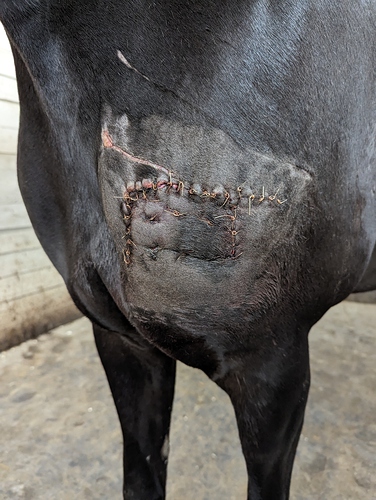Thanks JB - all great questions.
It’s been about a week since we’ve reduced her work. I think I mentioned in another comment, she spent all winter at a rehab facility, and was just recently brought back to a normal barn to continue rehab with walking and start trotting. Unfortunately the new barn was not as cautious as I would have hoped, and between a moment of panic in a stall during a particularly rowdy turnout time, and a spook and a rear during handwalking when she went straight up in the air, she seems to have irritated the injury.
The stall is generally not a problem - she likes her stall and she has a buddy next to her 24/7. During turnout time, they say they haven’t seen a problem since that first time (they turn out bit slower - take a horse out, clean a stall, take another horse out, etc - so it’s not everyone leaving all at once).
The hand walking is where it’s gotten a bit too spicy - she was doing ok since it was ~ 40 min walking 2x per day, some short trot sets, and some exercises at the walk (shoulder in, backing, gentle hills). Now it’s just ~ 15-20 min walking 2x per day, and I worry about the next leap into the air. She’s very quiet, until she’s not. Which is what makes it so hard to anticipate - you get lulled into a false sense of calm. Certainly on cooler days she needs something, I have a sound attenuating bonnet that I’ve asked them to use, and hopefully with warmer weather on the horizon she will feel less playful.
I will ask about acing for hand walks, though! Maybe that’s the right compromise. The current treating vet was ok trying a little bit of traz once a day, but by the looks of it, I’m not sure it’s enough so I’d love a second, back-up option.



